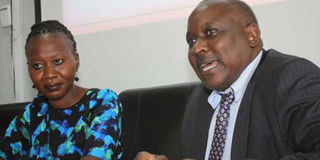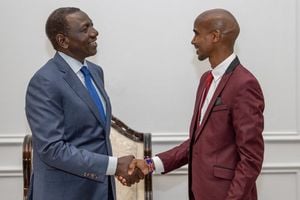Kenyan diaspora want electronic voting

Kenya Diaspora Alliance Global chairman Shem Ochuodho and IEBC Commissioner Roselyn Kwamboka address the media on January 26, 2017. PHOTO | ANTHONY OMUYA | NATION MEDIA GROUP
What you need to know:
- The study conducted by researchers from the University of North Carolina (US) between March 25, 2016 and December 5, 2016, shows that there is a strong interest by the diaspora in Kenyan politics mainly because they want to take part in electing their leaders as well as fulfilling their democratic duties.
- The Alliance says it represents 250,000 Kenyans in various countries abroad, scattered in 41 diaspora associations. It has been pushing for the Independent Electoral and Boundaries Commission (IEBC) to ensure they vote in the August elections.
- The Constitution, Article 82, says there shall be a law to ensure “the progressive registration of citizens residing outside Kenya, and the progressive realisation of their right to vote.”
Most Kenyans living abroad say they would like to vote by electronic means if a given chance to participate in elections.
A new survey conducted for the Kenya Diaspora Alliance shows that as many as eight in every ten people polled want to cast their ballots over the internet, in what could challenge Kenya’s future laws on voting.
Currently, voting is manual and Kenyan voters are required to cast their ballots in person.
The study conducted by researchers from the University of North Carolina (US) between March 25, 2016 and December 5, 2016, shows that there is a strong interest by the diaspora in Kenyan politics mainly because they want to take part in electing their leaders as well as fulfilling their democratic duties.
“For the diaspora, it (electronic voting) may be the only practical way for them to participate,” said Dr Shem Ochuodho, the Global Chairman of the Alliance, in Nairobi during the launch of the report.
“But we are under no illusion that electronic voting will happen this year. It is, perhaps, something that the Commission can look into for the future,” he said.
Prof Beth Elise Whitaker who led the research, conducted the study over the internet with links being shared in 67 countries across the world, where significant populations of Kenyans live, through online advertisements and the Kenya Diaspora Portal of the Foreign Affairs Ministry.
A third of the 777 respondents came from the United States, which is also the country with the largest estimated population of the Kenyan diaspora.
The questionnaire was in English but just 441 people managed to complete the questions, meaning that the study may not be entirely representative of the diaspora.
Also, researchers had to contend with the fact that the sample size may have had bias by picking out respondents who could access the internet and were educated, yet not every Kenyan living abroad, and especially in poor African countries with a clamp-down on the internet, could respond to the study.
The study, however, gives a bigger picture of what Kenyans abroad think of our electoral systems.
For example, about three in every ten people interviewed (27 per cent) said they trusted electronic voting a lot, with another 34 per cent saying they had moderate views about the system.
In fact, four in every ten people (38 per cent) said they do not trust the current manual voting where voters cast their paper ballots.
The desire for electronic voting is also influenced by the distance they have to travel to cast their ballots. The study shows while Kenyans abroad are generally keen followers of politics at home, just two in ten travel back home to vote. And because diaspora polling centres are situated in Kenyan embassies in capitals, some feel it is an extra expense to travel just to vote.
The Alliance says it represents 250,000 Kenyans in various countries abroad, scattered in 41 diaspora associations. It has been pushing for the Independent Electoral and Boundaries Commission (IEBC) to ensure they vote in the August elections.
The Constitution, Article 82, says there shall be a law to ensure “the progressive registration of citizens residing outside Kenya, and the progressive realisation of their right to vote.”
The diaspora are only allowed to vote for the presidency and the referendum.
In 2013 elections, 2637 Kenyans living in Uganda, Tanzania, Rwanda and Burundi were allowed to vote from among those in the diaspora.
At the time, IEBC argued it had considered costs, impact of diaspora voting on domestic politics and logistics.
The Commission currently has 2,542 from these four countries as registered voters. But the alliance is demanding that it expands the service to other countries.
“Ideally, in my experience as a member of the diaspora, I would have said, absolutely, let us go for electronic voting. But the law as it is now is that we vote by casting paper ballots,” said IEBC Commissioner Roselyn Kwamboka, who until recently worked for the UN in New York.
“The commission has a paper before it that is looking at the options for the expansion to other countries. That is still up for discussion and we will have wide consultations. But let us not do it in a way that may be seen as people in the diaspora are special,” she said.
The diaspora group forced their way in 2013. In June 2014, Judges Roselyn Nambuye, Daniel Musinga and Kathurima M’Inoti sitting on the Court of Appeal bench ruled that Kenyans should enjoy right to register and vote without restrictions.
The judges directed the IEBC to set up voter registration centres in the diaspora and to put in place infrastructure that will allow many Kenyans outside the country to register and participate in any election.
This means Kenyans living outside the country, including those with dual citizenship, could participate in elections.
In January last year, the IEBC published its Election Operations Plan (EOP) 2015 – 2017 announcing that diaspora voters will be registered in March next year. It said any country hosting at least 3,000 Kenyans qualifies to have a polling station.
But the Commission has also argued the programmes “comes with administrative challenges such as security and transportation of electoral materials, voter education and training.”




